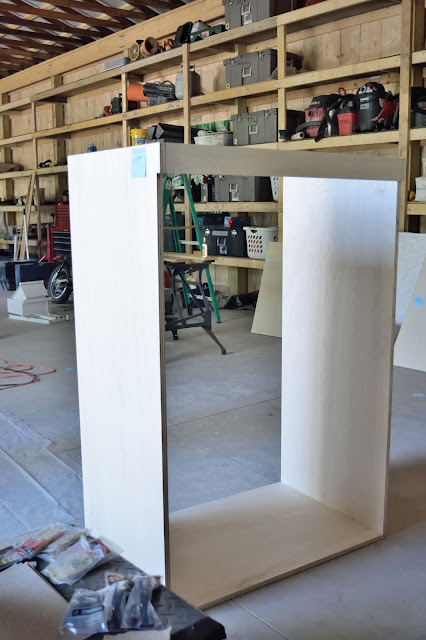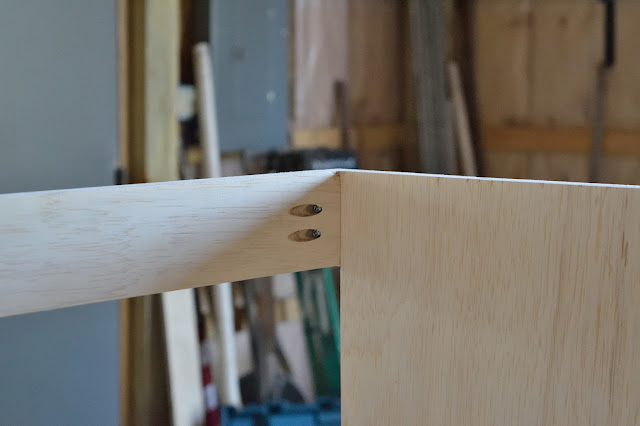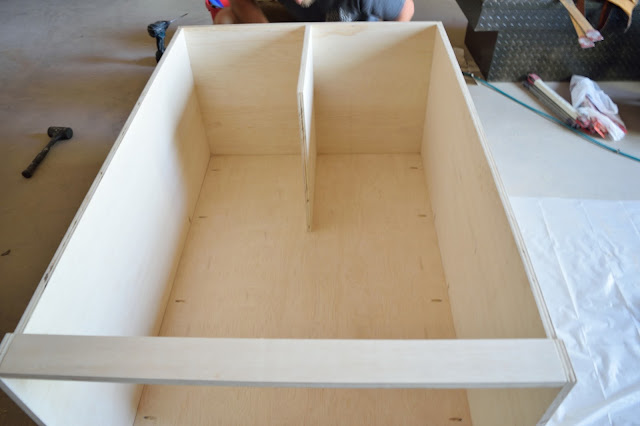To say this post has been on the back burner for a long time is an understatement. I started and finished this tack cabinet end of summer/beginning of fall as I was in dire need of more space. Even though I was only half leasing Panda I amassed a large assortment of tack and riding supplies and was looking for a better way to store it all.
I had looked to buy some cabinet but they were all super expensive ($1500++). I had also seen some plans online but couldn't find an exact layout I loved. I decided to design and build one myself and with the help of my brother in law Mike we set out to make just the cabinet I was looking for.
The Supplies (to the best of my memory, I could find recipets if you had specific questions)
(2) 8 x 4 3/4" plywood boards cut into various sizes for the walls and interior dividers of the cabinet
(1) 2 x 4 1/2" plywood for trim and grooming tote
(1) 1" dowel for handle of the grooming tote
trim molding for a more finished look (optional)
Coarse, medium, and fine grit sand paper
Sanding block
1-2 cans of stain
1-2 cans of varnish/polycrylic
1 staining sponge
Wood glue
Screws, saws, pocket screw jig
Sticky notes to label your cuts of wood
Trunk hardware
Ok so lets jump into it...
 |
| If you look closely you can see the blue sticky notes on some of the boards below |
Our next step was to attach the left and right walls to the base of the cabinet. We used a nail gun as well as wood glue and pocket screws to attach the three pieces together.
Once the walls were secure we attached a piece of wood to span between the two was to hold them together.
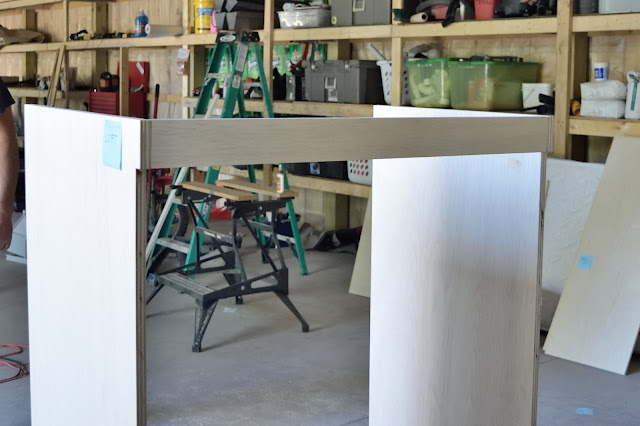 |
| You can see more of the sticky notes here |
Here is a close up of the tool that allows you to easily put in the pocket screws.
While my brother in law was working on the cabinet I set up some stain samples on scraps of the wood we were using to see what color/how many coats I liked. I used a walnut Minwax stain and was going for a darker wood. The first patch is one and two coats respectively without a wood primer and the second is the same stain, one and two coats with a primer.
 |
| Choose a dark enough stain so you only need 1 coat, TRUST ME!! |
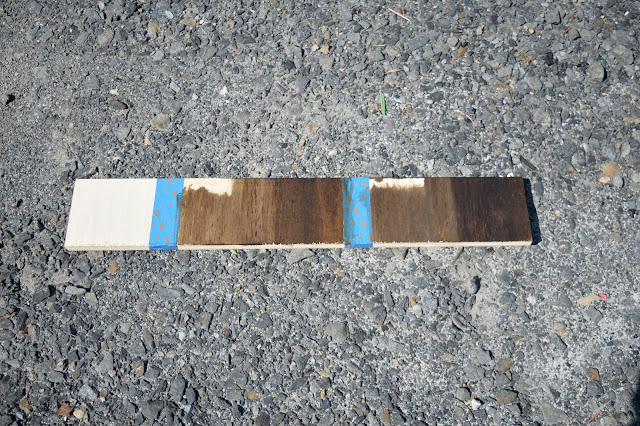 |
| This photo and organization makes me happy |
 |
| Finally starting to come together |
Once the back was attached we added the main shelving divider. You can also see the flush pocket screws that were used to attach the back of the cabinet.
Zoe was our little helper for the day, although I think she got into more trouble than anything else.
 |
| Zoe, the cutest little helper |
We also predrilled the holes for the drawer hardware so that they would be easy to attach after the drawer was stained.
Here is the cabinet base with all of the dividers in place. I also wanted a trunk lid top for the cabinet to store all of my little odds and ends so they were in easy reach. We added the bottom of that space using 1/2" plywood. We also bought special arms to hold the lid so that it wouldn't slam down on my while I was rummaging through my things.
 |
| You can't see it well but there is a second base right below the span of wood holding the left and right sides of the trunk together |
Then the priming and staining started. Here is the cabinet with one coat of stain...
 |
| The first of many coats |
 |
| This is where my back started hurting |
We then assembled and attached the doors, adding framing and eventually trim for a more finished look. We were getting pretty tired at this point and started winging it a little bit, staining some pieces we should have waited on and then had to tape off portions to catch up without darkening it unevenly.
 |
 |
| The interior of the cabinet, the drawers were attached the top right compartment, the grooming tote below that |
The three coats of stain were then followed by 2-3 coats of polycrylic which was lightly sanded between each coat. Seriously, by stain dark enough to get the color you want with only one coat. The staining was horrible and I had to contort myself to stain the underside of the shelving and walls.
 |
| She's so pretty, still waiting on her jewlery |
Here is an up close of the trim work on the doors of the cabinet.
I'll have to find photos of the two interior drawers, saddle rack, and bridle racks we made (as the second day went on we took fewer and fewer photos so we could get everything done in the short weekend).
I wouldn't hesitate to make another cabinet but I might consider using 1/2" plywood for everything (used for normal trunks anyway and my cabinet came out VERY heavy). I would also choose a harder veneer for the plywood since I notice some scuffing from pulling the grooming tote in and out each day. While I like having the trunk top, I would eliminate it even though I use it frequently. It took a lot of extra time and extra cuts to make it and I would rather have the shelf space for extra saddle pads. The only other thing I would change would be to build out the front cabinet doors so that I could store bridles full length since they don't quite fit in the main compartment without doubling up the reins.
Other than those few minor tweaks I love my cabinet and I'm so happy to have had the help to build it. When all was said and done I built the cabinet including all of its components and supplies for just under $500.


